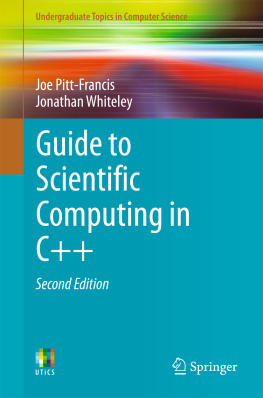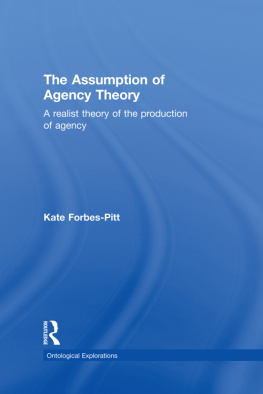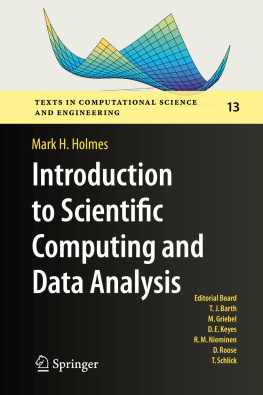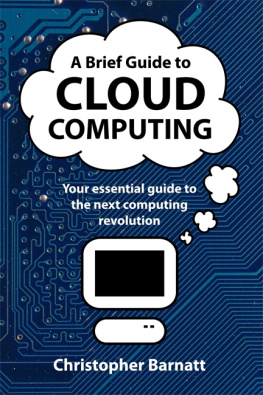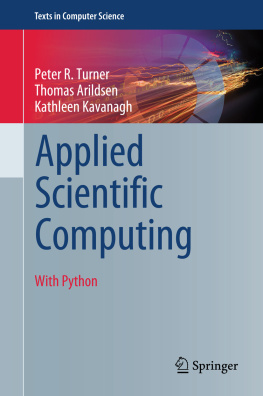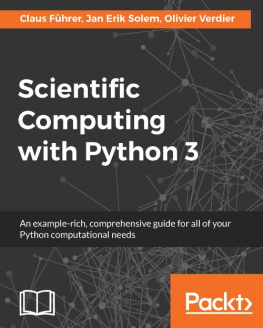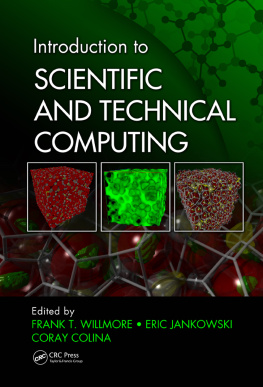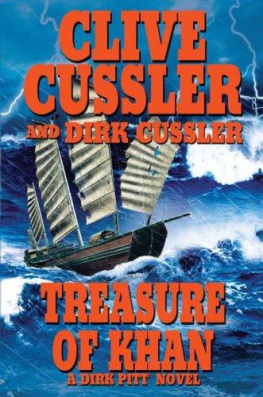Joe Pitt-Francis - Guide to Scientific Computing in C++
Here you can read online Joe Pitt-Francis - Guide to Scientific Computing in C++ full text of the book (entire story) in english for free. Download pdf and epub, get meaning, cover and reviews about this ebook. year: 0, publisher: Springer International Publishing, genre: Computer. Description of the work, (preface) as well as reviews are available. Best literature library LitArk.com created for fans of good reading and offers a wide selection of genres:
Romance novel
Science fiction
Adventure
Detective
Science
History
Home and family
Prose
Art
Politics
Computer
Non-fiction
Religion
Business
Children
Humor
Choose a favorite category and find really read worthwhile books. Enjoy immersion in the world of imagination, feel the emotions of the characters or learn something new for yourself, make an fascinating discovery.
- Book:Guide to Scientific Computing in C++
- Author:
- Publisher:Springer International Publishing
- Genre:
- Year:0
- Rating:4 / 5
- Favourites:Add to favourites
- Your mark:
- 80
- 1
- 2
- 3
- 4
- 5
Guide to Scientific Computing in C++: summary, description and annotation
We offer to read an annotation, description, summary or preface (depends on what the author of the book "Guide to Scientific Computing in C++" wrote himself). If you haven't found the necessary information about the book — write in the comments, we will try to find it.
Guide to Scientific Computing in C++ — read online for free the complete book (whole text) full work
Below is the text of the book, divided by pages. System saving the place of the last page read, allows you to conveniently read the book "Guide to Scientific Computing in C++" online for free, without having to search again every time where you left off. Put a bookmark, and you can go to the page where you finished reading at any time.
Font size:
Interval:
Bookmark:
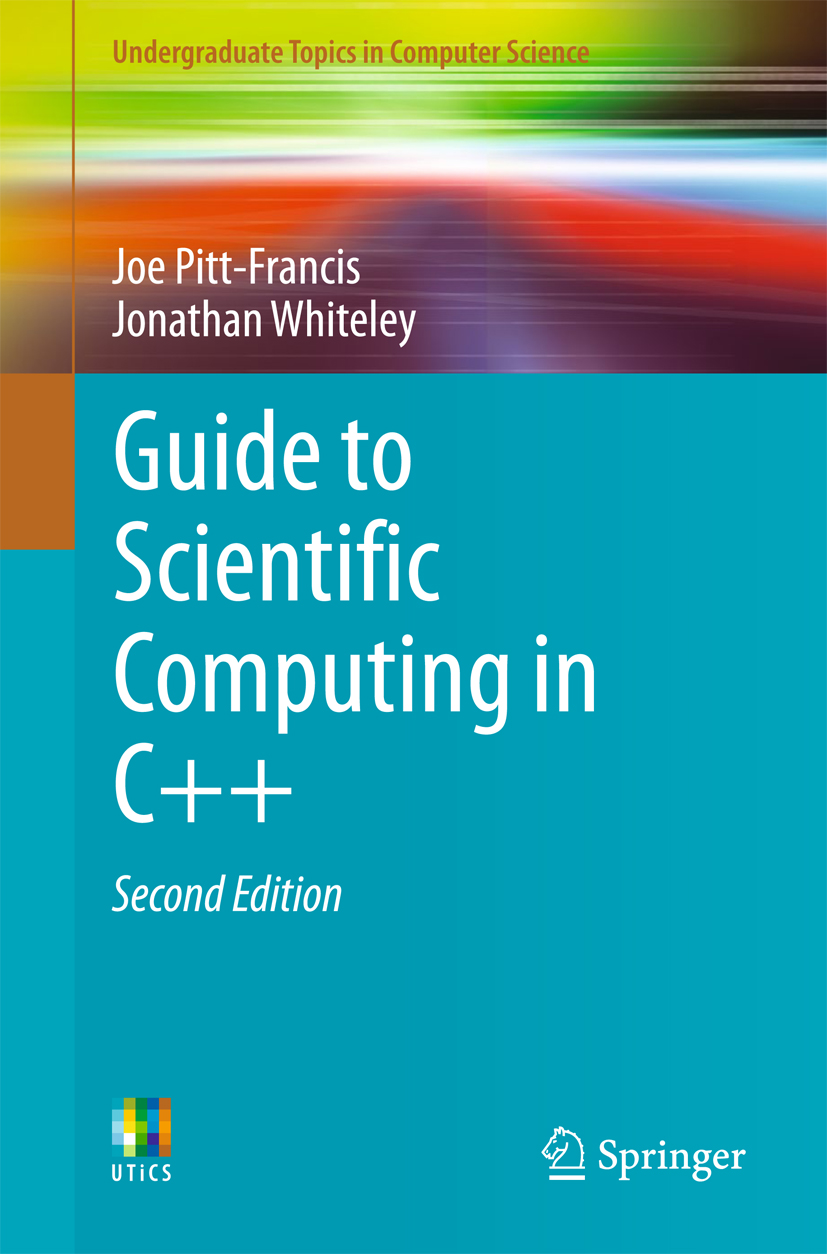
Advisory Board
Samson Abramsky, University of Oxford, Oxford, UK
Chris Hankin, Imperial College London, London, UK
Mike Hinchey, University of Limerick, Limerick, Ireland
Dexter C. Kozen, Cornell University, Ithaca, USA
Andrew Pitts, University of Cambridge, Cambridge, UK
Hanne Riis Nielson, Technical University of Denmark, Kongens Lyngby, Denmark
Steven S. Skiena, Stony Brook University, Stony Brook, USA
Iain Stewart, University of Durham, Durham, UK
Undergraduate Topics in Computer Science (UTiCS) delivers high-quality instructional content for undergraduates studying in all areas of computing and information science. From core foundational and theoretical material to final-year topics and applications, UTiCS books take a fresh, concise, and modern approach and are ideal for self-study or for a one- or two-semester course. The texts are all authored by established experts in their fields, reviewed by an international advisory board, and contain numerous examples and problems. Many include fully worked solutions.
More information about this series at http://www.springer.com/series/7592

This Springer imprint is published by the registered company Springer International Publishing AG part of Springer Nature
The registered company address is: Gewerbestrasse 11, 6330 Cham, Switzerland
The principle changes in this updated edition are additional material on software testing and on some of the new features introduced in the C++11 standard. When introducing this additional material, we have followed the same philosophy as when writing the first edition of this book. That is, we focus on a concise discussion of the key features that are most useful to the novice and intermediate programmer in the field of scientific computing. We have found this an effective approach when teaching this course to graduate studentsonce the basics have been mastered, students then have the confidence to find out about less well-used features themselves when they are needed.
This second edition would not be as completeor as enjoyable to updatewithout discussions with colleagues and other readers of the first edition, including those previously unknown to us who were kind enough to provide constructive feedback. We would like to express our gratitude to all who contributed in this way or offered their encouragement, and to the staff at Springer for inviting us to update the first edition.
Finally, we would both again like to thank our families for their love and support.
Many books have been written on the C++ programming language, varying across a spectrum from the very practical to the very theoretical. This book certainly lies at the practical end of this spectrum and has a particular focus for the practical treatment of this language: scientific computing.
Traditionally, Fortran and MATLAB have been the languages of choice for scientific computing applications. The recent development of complex mathematical modelsin fields as diverse as biology, finance and materials science, to name but a fewhas driven a need for software packages that allow computational simulations based on these models. The complexity of the underlying models, together with the need to exchange code between co-workers, has motivated programmers to develop object-oriented code (often written in C++) for these simulation packages. The computational demands of these simulations may require software to be written for parallel computing facilities, typically using the Message Passing Interface (MPI). The need to train programmers in the skills to program applications such as these led to the development of a graduate-level course C++ for Scientific Computing , taught by the authors of this book, at the University of Oxford.
This book provides a guide to C++ programming in scientific computing. In contrast to many other books on C++, features of the language are demonstrated mainly using examples drawn from scientific computing. Object orientation is first mentioned in Chap. 1 where we briefly describe what this phraseand other related terms such as inheritancemeans, before postponing any further discussion of object orientation or related topics until Chap. 6. In the intervening chapters until object orientation reappears, we present what is best described as procedural programming in C++, covering variables, flow of control, input and output, pointers (including dynamic allocation of memory), functions and reference variables. Armed with this grounding in C++, we then introduce classes in Chaps. 6 and 7. In these two chapters, where the main features of object orientation are showcased, we initially, for the sake of clarity, abandon our principle of using examples drawn from scientific computing. Once the topics have been presented however, we resume our strategy of demonstrating concepts through scientific computing examples. More advanced C++ features such as templates and exceptions are introduced in Chaps. 8 and 9. Having introduced the features of C++ required for scientific computing, the remainder of the book focuses on the application of these features. In Chap. 10, we begin to develop a collection of classes for linear algebra calculations: these classes are then developed further in the exercises at the end of this chapter. Chapter 11 presents an introduction to parallel computing using MPI. Finally, in Chap. 12, we discuss how an object-oriented library for solving second-order differential equations may be constructed. The importance of a clear programming style to minimise the introduction of errors into code is stressed throughout the book.
Font size:
Interval:
Bookmark:
Similar books «Guide to Scientific Computing in C++»
Look at similar books to Guide to Scientific Computing in C++. We have selected literature similar in name and meaning in the hope of providing readers with more options to find new, interesting, not yet read works.
Discussion, reviews of the book Guide to Scientific Computing in C++ and just readers' own opinions. Leave your comments, write what you think about the work, its meaning or the main characters. Specify what exactly you liked and what you didn't like, and why you think so.

